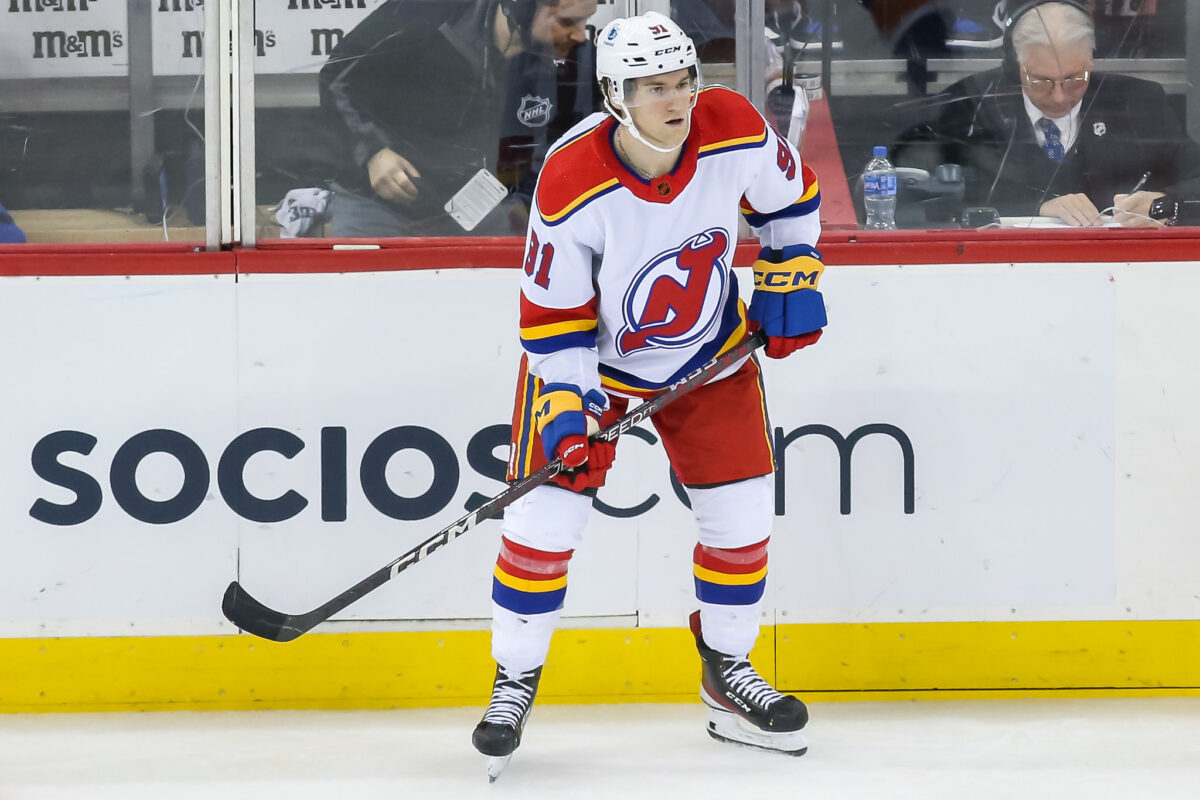When New Jersey Devils general manager Tom Fitzgerald spoke to the media on June 16 after Jesper Bratt’s contract extension got announced, one of the things he mentioned was that he’d like to get Dawson Mercer signed to a long-term deal:
Mercer had a more than solid rookie campaign in 2021-22, finishing with 17 goals and 42 points in 82 games. He followed that up with an impressive sophomore season in 2022-23, totaling 27 goals and 56 points in 82 contests.
Mercer has one year left on his entry-level contract but has been eligible for an extension since July 1. While it may take some time to re-up him, his next deal should result in a significant payday from his entry-level cap hit of $894,167. Let’s look at his production and find a few comparables that’ll give us an idea of what a long-term pact between the two sides could look like.
Determining Comparables for Mercer
The Devils drafted Mercer with the 18th overall pick in the 2020 draft, but it did not take him long to make his way to the NHL. He spent one final year in the Quebec Major Junior Hockey League (QMJHL) in 2020-21, which was shortened by COVID. But he was in the NHL just a year after the Devils drafted him in Oct. 2020.
Mercer got off to a hot start in 2021-22 but eventually cooled off as the season progressed, as most rookies do when playing a full 82-game schedule. Still, it was easy to see the potential in him. He got off to a somewhat slow start this past season, but he finished the year hot, totaling 16 goals and 27 points in his final 29 games.

Though counting totals usually take precedence in contract negotiations, it’s worth looking at some advanced stats for our purposes. Mercer’s play has been worth a total goals above replacement (GAR) of 14.4 over the last two seasons (5.2 in 2021-22 and 9.2 this past season). He doesn’t turn 22 until October, so there’s reason to believe that he’ll grow even more valuable once his next contract kicks in a year from now.
Since Mercer will be coming off his ELC when his extension kicks in, we need to find comparables for players who signed pricey extensions coming out of their ELCs. From the looks of it, there are quite a few comps that should give us a good baseline of what his next deal will look like:
| Player | Age | Games Played | Goals | Assists | Points | GAR | Contract (Years x Cap hit) |
| Alex Tuch | 22 | 84 | 15 | 22 | 33 | 4.8 | 7 x $4.75 million |
| Drake Batherson | 23 | 99 | 23 | 30 | 58 | 3.5 | 6 x $4.975 million |
| Travis Konecny | 22 | 233 | 59 | 65 | 124 | 3 | 6 x $5.5 million |
| Brock Boeser (2019) | 22 | 140 | 59 | 57 | 116 | 23.3 | 3 x $5.875 million |
| Jake Guentzel | 24 | 158 | 54 | 60 | 114 | 15.4 | 5 x $6 million |
| Matt Boldy | 21 | 89 | 27 | 43 | 70 | 25 | 7 x $7 million |
| Cole Caufield | 22 | 123 | 53 | 31 | 84 | 10.2 | 8 x $7.85 million |
| Dawson Mercer | 21 | 164 | 44 | 54 | 98 | 14.4 | TBD |
Some of these are more likely than others, but the idea is to give as wide a range as possible. Tuch had not played much when the Vegas Golden Knights signed him to that seven-year extension. But they bet on his potential, and it worked out for them and now the Buffalo Sabres; he finished with 36 goals and 79 points in 74 games for the Sabres in 2022-23.
Related: Devils’ Final Offseason Move Should Be for a Goalie
Tuch’s $4.75 million cap hit is quite valuable, but it’s unlikely Mercer gets paid that little annually, given his output already. The Ottawa Senators took a similar approach when signing Batherson. The production wasn’t quite there when he signed in Sept. 2021, but the Senators bet on his potential, and they now have him on a valuable cap hit of $4.975 million. Yet, Mercer has produced more than Batherson did before he signed a new contract. So which comps are the best?
The Standouts for Mercer’s Next Deal
When looking at the players above, Konecny, Boeser and Guentzel are the best comparables for Mercer’s next contract. Like Mercer, Konecny was a bit of a later pick (24th overall) in the first round of the NHL Draft. Their points per game (0.54 to 0.59) are quite similar, so there’s an argument Mercer’s deal could look close to his, but Boeser and Guentzel compare well too.
Boeser signed his first post-ELC contract in 2019. Though it was only for three years, his cap hit of $5.875 million could be a number Mercer ends up with. Boeser was viewed as a high-end goal scorer at the time because of his shooting ability. Mercer doesn’t seem to have that kind of reputation yet, but if his close to the 2022-23 season is any indication, he has 30-goal potential. And that reputation could soon follow.

Guentzel was one of the few comparables above that signed his contract mid-season. When he re-upped in Dec. 2018, he had 33 points in 36 games with the Penguins to start the 2018-19 campaign. It was partly a bet on potential from the Penguins’ perspective, but the production was already there in his first two-and-a-half seasons in the NHL. Guentzel’s $6 million cap hit might seem a bit pricey for Mercer, but it’s reasonable if the Devils are betting on him to build off his production like the Penguins did with Guentzel.
As for Caufield and Boldy, it’s unlikely Mercer gets an extension in the $7 million range or north of that. They’re just in the table above to give you an idea of players who have signed lucrative extensions coming out of their ELCs. But when it comes to the reasonable comps for Mercer, it’s Konecny, Boeser and Guentzel who stand out the most.
Does Mercer Get 8 Years?
While it would not surprise me if the Devils and Mercer agreed on an eight-year deal, I’m not sure it’s all that likely. Eight-year contracts are usually reserved for core pieces (Jack Hughes, Nico Hischier, Bratt, etc.). And though many fans may view Mercer as a core piece, he’s more of a complementary player. Granted, a very good one.
Still, the Devils will want to eat some UFA years on Mercer’s next deal. He’s eligible for unrestricted free agency in 2028, four years after an extension would kick in, so there’s really no upside in any kind of bridge deal. At a minimum, the Devils will want to go six years to eat two UFA years. That’d make him UFA-eligible in 2030 when he turns 29.
As for the cap hit, a rising salary cap will at least be a consideration in negotiating a new deal. The cap ceiling could rise to as much as $95 million in a couple of years’ time. Even after signing Bratt and Timo Meier to big-time extensions, the Devils should have some wiggle room to go around $6 million annually for Mercer, a number I think he will get very close to whenever he re-signs.

It also depends a bit on if the Devils get him signed this summer or if it drags into the season and Mercer signs in the middle of the year like Guentzel. If Mercer produces at the rate Guentzel did to start the 2018-19 campaign, that contract could become a bit more expensive. But even then, it’s hard to imagine going too much further north of $6 million.
Ultimately, my best guess is Mercer signs for six years — buying two UFA years — at a cap hit of around $5.875 million to $6 million since most complementary players coming off their ELCs don’t sign for the max term. Still, an eight-year deal is not out of the realm of possibility, especially if max years help keep the cap hit down a bit. Either way, a long-term extension is likely in the cards soon for another one of the Devils’ top young players.
* * *
Advanced stats from Evolving-Hockey